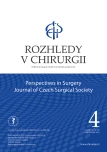-
Medical journals
- Career
Commentary on the current situation regarding the examination of a child with suspected child abuse and neglect syndrome
Authors: R. Štichhauer 1; P. Rejtar P. 2
Authors‘ workplace: Klinika dětské chirurgie a traumatologie, Fakultní nemocnice Hradec Králové, Lékařská fakulta Hradec Králové, Univerzita Karlova 1; Radiologická klinika, Fakultní nemocnice Hradec Králové, Lékařská fakulta Hradec Králové, Univerzita Karlova 2
Published in: Rozhl. Chir., 2023, roč. 102, č. 4, s. 180-181.
Category: Commentary
The commentary complements the case study by A. Bozic, M. Baskovic, G. Ivanac. Abuse of a newborn − the need for professional awareness of this increasingly common social problem. RvCH 2023;102(4):174–179
The child abuse and neglect syndrome (CAN) is a very serious issue in the Czech Republic, as it is throughout the world. The incidence of these injuries and conditions is increasing. According to data from the Ministry of Labour and Social Affairs, more than 150 cases of physical child abuse were confirmed in 2022. The question is how many more such cases remain undetected. Diagnosis of the CAN syndrome is always multidisciplinary and the most involved physicians in the diagnostic algorithm are radiologists, pediatricians, pediatric surgeons, neurologists, neurosurgeons. Subsequently, in all cases, collaboration with doctors of Institute of Forensic Medicine is also necessary. When examining a child suspected of having CAN syndrome, the examining physician has a duty to report. By law, the attending physician is obliged to inform the municipal authority − Department for the Social and Legal Protection of Children (OSPOD) of his or her suspicions. Reporting is possible directly on the information portal of the OSPOD, or in the case of hospitalized children, most often through the social department of the relevant hospital. At the same time, the attending physician must report the situation to the Police of the Czech Republic or the public prosecutor’s office.
Depending on the degree of injury or the immediate threat to the life and health of the abused child, a diagnostic algorithm is initiated once the child is stabilized. This is largely provided by the doctors of department of diagnostic radiology. In the past, the babygram, a radiological examination of the child’s entire skeleton in a single image, has been completely abandoned. The Czech Radiological Society has developed a recent procedure for radiological examination of a child with suspected abuse. This so-called “bone protocol” is described in the Official Journal of the Ministry of Health issued in 2022 (Official Journal MZ_14-22). Initially, targeted X-rays of the skull, chest, abdomen, pelvis and extremities are the basis. After two weeks, a follow-up bone scan protocol is then completed with a limited number of chest, lower and upper limb images. A CT scan is indicated only if brain injury is suspected (CT of brain and cervical spine). If available, MRI of the brain and cervical spine is performed in neonates and infants. At the same time, the doctors of the Radiological Society of the Czech Society of Radiology initiated the development of general procedures for the examination of a child with suspected maltreated child syndrome. In cooperation with lawyers, the document “Postavme se na stranu dětí” was created (https://www.mzcr.cz/ postavme-se-na-stranu-deti-doporuceni-pro-vyuzitizobrazovacich - metod-pri-podezreni-na-tyrane-dite/). This document not only provides an algorithm for the examination, but also answers some legal aspects.
The child abuse and neglect syndrome is a topical and sensitive issue that needs careful attention. Any child with a discrepancy between the anamnestic data on the occurrence of the injury and the actual clinical findings should be investigated for possible abuse. The activity of the Czech Radiological Society has led to the establishment of examination rules valid for the Czech Republic. However, the basic factors that could lead to a reduction in the incidence of the CAN are, in particular, prevention, regular and frequent information of the general public and consistent punishment of the culprits (aggressors).
Labels
Surgery Orthopaedics Trauma surgery
Article was published inPerspectives in Surgery

2023 Issue 4-
All articles in this issue
- Bábel onkoprevence a zájem chirurgů
- Extent of surgical procedure in triple negative breast carcinomas
- Unusual foreign body in the nasal cavity after craniofacial injury
- Surgical treatment of hyperparathyroidism with a pathologically changed parathyroid gland found in the mediastinum
- Commentary on the current situation regarding the examination of a child with suspected child abuse and neglect syndrome
- The history of inguinal hernia surgery
- Retroperitoneal tumour resection in fifteen consecutive cases: Single centre experience
- Abuse of a newborn – the need for professional awareness of this increasingly common social problem
- Perspectives in Surgery
- Journal archive
- Current issue
- Online only
- About the journal
Most read in this issue- The history of inguinal hernia surgery
- Extent of surgical procedure in triple negative breast carcinomas
- Unusual foreign body in the nasal cavity after craniofacial injury
- Surgical treatment of hyperparathyroidism with a pathologically changed parathyroid gland found in the mediastinum
Login#ADS_BOTTOM_SCRIPTS#Forgotten passwordEnter the email address that you registered with. We will send you instructions on how to set a new password.
- Career

